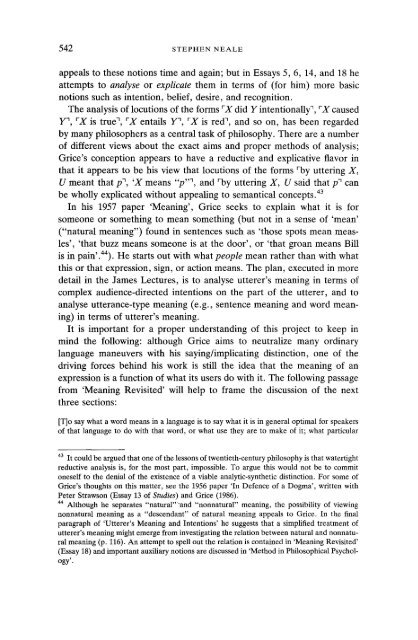Paul Grice and the philosophy of language
Paul Grice and the philosophy of language
Paul Grice and the philosophy of language
Create successful ePaper yourself
Turn your PDF publications into a flip-book with our unique Google optimized e-Paper software.
542 STEPHEN NEALE<br />
appeals to <strong>the</strong>se notions time <strong>and</strong> again; but in Essays 5, 6, 14, <strong>and</strong> 18 he<br />
attempts to analyse or explicate <strong>the</strong>m in terms <strong>of</strong> (for him) more basic<br />
notions such as intention, belief, desire, <strong>and</strong> recognition.<br />
The analysis <strong>of</strong> locutions <strong>of</strong> <strong>the</strong> forms rX did Y intentionally ", rX caused<br />
Y', ~X is true ", ~X entails Y', rX is red 7, <strong>and</strong> so on, has been regarded<br />
by many philosophers as a central task <strong>of</strong> <strong>philosophy</strong>. There are a number<br />
<strong>of</strong> different views about <strong>the</strong> exact aims <strong>and</strong> proper methods <strong>of</strong> analysis;<br />
<strong>Grice</strong>'s conception appears to have a reductive <strong>and</strong> explicative flavor in<br />
that it appears to be his view that locutions <strong>of</strong> <strong>the</strong> forms %y uttering X,<br />
U meant that p", 'X means "p"~, <strong>and</strong> rby uttering X, U said that p7 can<br />
be wholly explicated without appealing to semantical concepts. 43<br />
In his 1957 paper 'Meaning', <strong>Grice</strong> seeks to explain what it is for<br />
someone or something to mean something (but not in a sense <strong>of</strong> 'mean'<br />
("natural meaning") found in sentences such as 'those spots mean measles',<br />
'that buzz means someone is at <strong>the</strong> door', or 'that groan means Bill<br />
is in pain'.44). He starts out with what people mean ra<strong>the</strong>r than with what<br />
this or that expression, sign, or action means. The plan, executed in more<br />
detail in <strong>the</strong> James Lectures, is to analyse utterer's meaning in terms <strong>of</strong><br />
complex audience-directed intentions on <strong>the</strong> part <strong>of</strong> <strong>the</strong> utterer, <strong>and</strong> to<br />
analyse utterance-type meaning (e.g., sentence meaning <strong>and</strong> word meaning)<br />
in terms <strong>of</strong> utterer's meaning.<br />
It is important for a proper underst<strong>and</strong>ing <strong>of</strong> this project to keep in<br />
mind <strong>the</strong> following: although <strong>Grice</strong> aims to neutralize many ordinary<br />
<strong>language</strong> maneuvers with his saying/implicating distinction, one <strong>of</strong> <strong>the</strong><br />
driving forces behind his work is still <strong>the</strong> idea that <strong>the</strong> meaning <strong>of</strong> an<br />
expression is a function <strong>of</strong> what its users do with it. The following passage<br />
from 'Meaning Revisited' will help to frame <strong>the</strong> discussion <strong>of</strong> <strong>the</strong> next<br />
three sections:<br />
[T]o say what a word means in a <strong>language</strong> is to say what it is in general optimal for speakers<br />
<strong>of</strong> that <strong>language</strong> to do with that word, or what use <strong>the</strong>y are to make <strong>of</strong> it; what particular<br />
43 It could be argued that one <strong>of</strong> <strong>the</strong> lessons <strong>of</strong> twentieth-century <strong>philosophy</strong> is that watertight<br />
reductive analysis is, for <strong>the</strong> most part, impossible. To argue this would not be to commit<br />
oneself to <strong>the</strong> denial <strong>of</strong> <strong>the</strong> existence <strong>of</strong> a viable analytic-syn<strong>the</strong>tic distinction. For some <strong>of</strong><br />
<strong>Grice</strong>'s thoughts on this matter, see <strong>the</strong> 1956 paper 'In Defence <strong>of</strong> a Dogma', written with<br />
Peter Strawson (Essay 13 <strong>of</strong> Studies) <strong>and</strong> <strong>Grice</strong> (1986).<br />
44 Although he separates "natural""<strong>and</strong> "nonnatural" meaning, <strong>the</strong> possibility <strong>of</strong> viewing<br />
nonnatural meaning as a "descendant" <strong>of</strong> natural meaning appeals to <strong>Grice</strong>. In <strong>the</strong> final<br />
paragraph <strong>of</strong> 'Utterer's Meaning <strong>and</strong> Intentions' he suggests that a simplified treatment <strong>of</strong><br />
utterer's meaning might emerge from investigating <strong>the</strong> relation between natural <strong>and</strong> nonnatural<br />
meaning (p. 116). An attempt to spell out <strong>the</strong> relation is contained in 'Meaning Revisited'<br />
(Essay 18) <strong>and</strong> important auxiliary notions are discussed in 'Method in Philosophical Psychology'.














